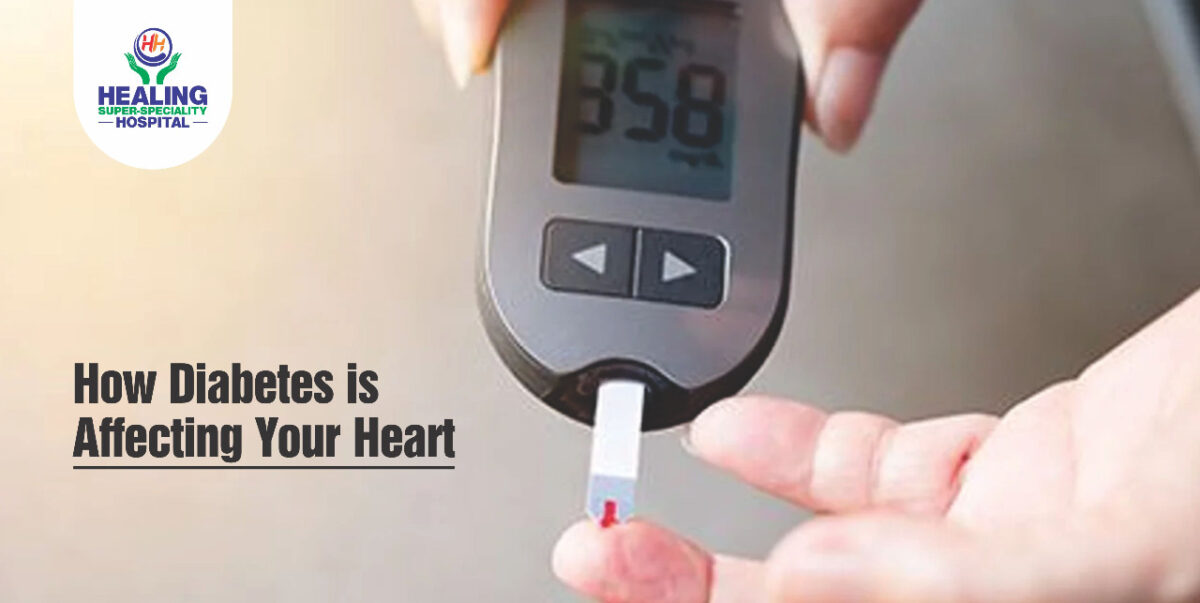A diabetic patient has more chances of developing cardiovascular disease in comparison with people without diabetes. Diabetes can induce chronic inflammation and elevated blood sugar levels.
Both these conditions cause damage to the artery walls, rendering them more vulnerable to atherosclerosis. Diabetes can also form blood clots and scar tissue to develop in the heart muscles.
Heart disease is the leading cause of death for people with type 2 diabetes. You can reduce the risk of heart attack by doing a variety of activities, with understanding the connection between diabetes and heart disease as the first step towards prevention.
| Contents: 1. How to lower your risks? 2.What are some symptoms of a Heart Attack? |

How to lower your risks?
- Maintain a healthy weight: Increased calorie consumption and reduced physical activity are the leading causes of obesity, which in turn leads to diabetes and cardiovascular diseases. Nowadays, obesity and diabetes develop at a younger age as a result of increased calorie consumption and reduced physical activity.
Therefore, it is important to exercise at least five days a week, around 45 minutes daily. Exercise increases your glucose management and enhances your cardiovascular system, reducing your reliance on diet and medications. It also helps you lose weight, which lowers the risk of both diseases.
- Manage your blood pressure levels: One of the most common risk factors for heart disease in diabetics is high blood pressure. It puts your heart under stress and harms your blood vessels.
This makes you more vulnerable to a number of issues such as stroke and heart attack. The best way to control your blood pressure is to eat a balanced diet, exercise regularly, and take your medications on time, if any prescribed by your doctor.
- Manage cholesterol levels: High cholesterol levels raise the chances of getting heart disease. An accumulation of fatty plaque in your blood vessels can be caused by having too much LDL cholesterol and not enough HDL cholesterol. This can result in blockages, which can lead to a heart attack or stroke.
While genetics play an important role in cholesterol levels, you can still control them by adopting a healthier lifestyle.
- Quit Smoking: It is a well-known fact that smoking increases the chances of getting heart disease. Therefore, you should quit smoking immediately if you have diabetes because both smoking and diabetes narrow blood vessels. Smoking also raises the risk of developing other long-term issues such as lung cancer.
To get a consultation regarding which smoking cessation methods might work best for you, book an appointment with the best heart specialist hospital in Chandigarh here:
https://healinghospital.co.in/cardiology-department/
- Change your sedentary lifestyle: Sedentary lifestyle can significantly increase heart disease risk factors such as high blood pressure and obesity. Exercising daily and not sitting for long intervals could be a good start. You can also take part in other activities that you enjoy such as cycling, dancing, walking, gyming, etc.
- Don’t stress: Diabetes management isn’t always easy. When you have diabetes, you are likely to feel tired, sad, or frustrated. But, long-term stress can cause blood glucose and blood pressure to rise. Deep breathing, yoga, meditation, or simply doing what you love are all good ways to reduce stress.
- Getting A1C test: The A1C test reveals your three-month average blood glucose level. The higher your A1C test, the higher your blood glucose levels have been in the previous three months. High blood glucose levels can do a lot of harm to your body.
Many people with diabetes have an A1C target of less than 7%. Some people can benefit from a slightly higher A1C goal. Seek consultation with the best heart specialist hospital in Chandigarh on what your objectives should be: https://healinghospital.co.in/cardiology-department/
- Take your medications on time: Medicines play an important role in your treatment and so you should take them on time. Medicines may be of assistance in meeting your A1C, blood pressure, and cholesterol targets.
The medicines prescribed by your doctor also help in reducing the chances of getting a blood clot, having a heart attack or a stroke.

What are some symptoms of a Heart Attack?
Following are some of the common signs and symptoms of a heart attack:
- Chest pain
- Breathing problem
- Feeling lightheaded
- Sweating
- Pain in the left arm, shoulders and jaw
- Nausea
If you experience any of the above symptoms, call the emergency number or ask someone to take you to the hospital immediately. Getting to a hospital within an hour of a stroke can help prevent permanent damage.
























